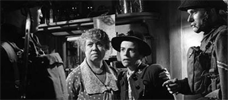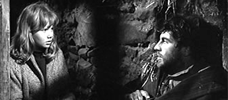Reviews
Alberto Cavalcanti
UK, 1942
Credits
Review by Michael Nordine
Posted on 11 May 2011
Source 35mm print
Categories TCM Classic Film Festival 2011
Went the day well?
We died and never knew.
But, well or ill,
Freedom, we died for you.
So goes the epigraph that opens Went the Day Well?, a piece of thinly-veiled (and poorly-timed) propaganda that isn’t quite as somber as these lines might suggest. A sort of Red Dawn for the World War II era, the film pits God’s England against Hitler’s Germany via a regiment of Nazis who disguise themselves as British soldiers in order to more easily infiltrate and occupy the fictional village of Bramley End. Before the outlandishness of this premise fully sinks in, it’s also worth noting that director Alberto Cavalcanti, a self-proclaimed “surrealist with realist tendencies,” was from Brazil. So what we have in Went the Day Well? is a Brazilian-helmed propaganda film playing to distinctly British fears which, to top it all off, had subsided by the time of its release: the Blitz was over and it had been clear for a while that there would be no occupation. Given this last fact in particular, it begins to seem likely that Cavalcanti’s film was as strange then as it is now.
The enemy walks among us in the film, whether dressed as a friendly neighbor or, far more sinisterly, a British soldier. Wolves in sheep’s clothing, they eat their hosts’ food, help them wash their dishes, and carry on as though nothing unusual were occurring. Along the way, there are a few slip-ups that give away their presence. “I refuse to see anything sinister in an elongated t,” says a woman in reference to the discovery of some decidedly German-looking handwriting scribbled on a piece of paper. Whether she knows it or not, this lone voice of trust in something non-British is on to something: that her neighbors define themselves in relation to the otherness of their enemy. Not only a reminder to say something if you see something, Went the Day Well? serves as an anthropological artifact of its day and age, one showing a citizenry at once filled with pride by the very idea of serving their country in some small way and scared to the death of their unseen nemesis. It’s as though the more they assure themselves of the Germans’ inferiority, the less they believe it. The acts this disbelief provokes are often jarring, but they pale in comparison to the psychological makeup behind them.
Perhaps the largest, most on-point question all this raises is one of intent. What Went the Day Well? means to convey is obvious, but that its seeming lack of introspection happens to speak volumes about the precise mindset that birthed the film is likely incidental. This tension between the intentional and unintentional is worth noting, among other reasons, for the sometimes-uncomfortable viewing experience it engenders. Often more silly than thought-provoking, much of the film’s actual action comes in the form of over-the-top remarks (Q: “You know what morale is?” A: “Yeah, it’s what the Wops ain’t got”) and violence. And indeed, the film is quite brutal for its time: Germans and Britons alike are frequently dispatched via axe, grenade, and falling objects. Still more striking is the fact that, even in a contemporary viewing, Cavalcanti manages to suspend disbelief to the high extent that he absolutely has to in order to maintain dramatic tension; there are few, if any, points at which Went the Day Well? doesn’t inspire its audience to cheer the Brits on. The Nazis are, of course, the most easy-to-despise group of the last century, but to revel in their demise somehow makes one feel complicit in the film’s black-and-white aims.
This one-sidedness is as much a propagandist success as it is a cinematic flaw. Went the Day Well?, to put it in the parlance of its times, depicts the Germans as sausage-eating Krauts as quick to shoot a child as they are to praise the Fuhrer. Conversely, the English are near-perfect beings whose resourcefulness is matched only by their good will. Good samaritans all, they receive no small pleasure from helping their fellow citizens (especially those whom they take to be brave soldiers) and funnel any negative impulses into their hatred for the Nazis; they’re further infused with courage and determination by the certainty that God is on their side against their singularly evil opponent. What Went the Day Well? offers is not only a portrait of an idyllic country existence but, more important to its goals, a glimpse at how the mere presence of the Nazis could soil that way of life. And in this regard, it’s an almost unqualified success.
The demonization of one’s enemy through various media - pamphlets, radio, and now cinema - is nearly as historically commonplace as war itself, and, as such, each instance of it should be addressed through its own particular lens. To look down on the blatant propagandizing of Went the Day Well? is pointless insofar as it disallows the possibility of learning from it, but it’s nevertheless difficult to not take certain elements of the film with a grain of salt.
Some seventy years after its release, Went the Day Well? is perhaps more interesting as a cabinet of cinematic curiosity than as a standalone work. It inadvertently says as much about what it means for a film to be almost entirely the product of its environment as it does about the story it means to tell; had the film been released at any point in the latter half of the 20th century - or even the beginning of the 21st - it likely would have been accompanied by self-aware winks to the audience that assure us it’s practically a parody of itself. Whether it’s despite or because of all this I can’t say to a certainty, but there’s nonetheless something quite charming about Cavalcanti’s film, like a grandparent whose casual racism is laughed off rather than corrected because, really, what else can be done? Went the Day Well? elicited far more collective groans, cheers, and sighs of relief than any other I saw at TCM Fest. (I’ll leave you to decide how much this had to do with the crowd’s median age being between fifty and sixty.) It’s that rare film which succeeds even as it doesn’t, something to which this audience participation can attest.
More TCM Classic Film Festival 2011
-

The Outlaw Josey Wales
1976 -

A Place in the Sun
1951 -

Went the Day Well?
1942 -

Becket
1964 -

Whistle Down the Wind
1961 -

The Constant Nymph
1943 -

The Third Man
1949
We don’t do comments anymore, but you may contact us here or find us on Twitter or Facebook.



